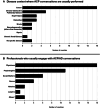Mapping advance care planning and advance directives in Latin America
- PMID: 40913239
- PMCID: PMC12413744
- DOI: 10.1186/s12904-025-01849-5
Mapping advance care planning and advance directives in Latin America
Abstract
Background/aims: The extent to which low- and middle-income countries have implemented Advance Care Planning (ACP) and Advance Directives (AD) remains unclear. We aimed to map the current status of ACP/AD in Latin America.
Methods: This cross-sectional, mixed-methods survey of ACP/AD in LA comprised interviews with 18 key informants from 18 out of 20 countries, most of whom were appointed by national Palliative Care Associations. Online interviews were conducted with each informant, covering a range of relevant topics from AD regulations to the use of ACP/AD in the context of end-of-life clinical decision making. We performed member checking and data triangulation to confirm our findings.
Results: Only eight (44%) countries have some form of ACP/AD regulations. Most regulatory frameworks tend to adopt a legalistic pattern heavily influenced by the North American model. Despite that characteristic of AD regulations in LA, the leading strategy used by patients to avoid unwanted treatment at the end of life is through conversations with their families, whereas the least common strategy was consulting with a lawyer. In six (33%) countries, informants believed it was common for patients to grant their families permission to modify their previous choices regarding future treatments. The religiosity/spirituality of populations play an important role in the implementation of ACP in the region. Additionally, respecting patients' preferences of care at the end of life appears to be tied more to aspects related to the characteristics of doctor-patient relationship, and the degree of integration of palliative care into the healthcare system than the existence or content of AD regulations. There was consensus that none of the countries provide sufficient education about ACP/AD to healthcare professionals.
Conclusions: Our findings encourage rethinking ACP/AD in LA from a decolonial perspective, considering characteristics such as the preference for a relational model of autonomy in several countries and the importance of taking the religiosity/spirituality of individuals into account during ACP conversations. Our data also suggest that honoring patients' preferences of care at the end of life entails integrating palliative care into health care systems, educating healthcare professionals and the population, and fostering longitudinal trusting relationships between those professionals, patients, and their families.
Keywords: Advance care planning; Advance directives; Aging; Cross-sectional studies; Latin America; Palliative care.
© 2025. The Author(s).
Conflict of interest statement
Declarations. Ethics approval and consent to participate: This study was approved by the Ethics Review Committee of the Botucatu Medical School, São Paulo State University under #57903722.8.0000.5411 on May 5, 2022. All participants provided written informed consent. Consent for publication: Not applicable. Competing interests: The authors declare no competing interests.
Figures


References
-
- United Nations, Department of Economic and Social Affairs, Population Division. World Population Ageing. Highlights. New York: United Nations; 2019. p. 2019.
-
- Ham-Chande R, Nava-Bolaños I. Convergence Toward Demographic Aging in Latin America and the Caribbean. 2019. 10.1146/annurev-soc-073018. - DOI
MeSH terms
Grants and funding
LinkOut - more resources
Full Text Sources
Medical

